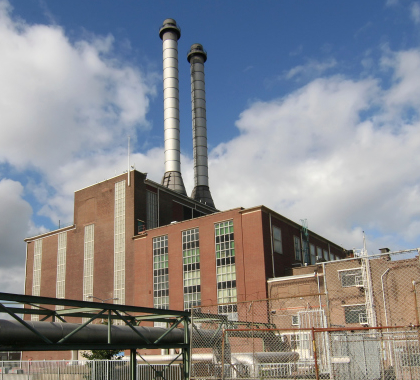A co-op wholesale power supplier in Colorado and New Mexico announced a major shift from coal-fueled power plants to wind and solar industrial facilities in its electric power generation operations.
The power supplier, Tri-State Generation and Transmission Association, serves 43 rural electric cooperatives in Colorado, Nebraska, New Mexico, and Wyoming.
In a January 9 press release, Tri-State said it would close its only remaining New Mexico coal-fired power plant, the Escalante Station, by the end of 2020 and close its remaining Colorado coal plants and the Colowyo coal mine in northwest Colorado by 2030. Combined with Tri-State’s closure of the Nucla coal power plant in 2019, those closures represent 1,001 megawatts (Mw) of coal-fueled electric power generation being taken offline, approximately 53 percent of the co-op’s 1,884 Mw total coal power capacity.
Tri-State said the closures will cost approximately 600 power plant and mine employees their jobs.
Solar, Wind Replacement
Tri-State announced the co-op would replace its coal-fueled electric power capacity with 304 Mw of new wind projects and 715 Mw of new solar projects built within the service territories of seven of its member organizations in Colorado and New Mexico. When the new solar and wind industrial facilities are combined with the co-op’s existing hydroelectric, solar, and wind capacity, renewable power will account for approximately 50 percent of Tri-State’s total electric power generating capacity by 2024.
At a press conference at the state capitol in Denver, with Colorado Gov. Jared Polis by his side, Tri-State’s CEO Duane Highley said the steep decline in solar and wind power costs over the past decade means the transition away from coal will save its member electric power associations money.
Tri-State, however, provided no estimate of how much its members would save from the switch from coal to renewables, or how much the transition might cost its member associations before they start seeing savings.
Pressure to Change
Tri-State’s actions came in response to political pressure and demands from its member electric power associations to incorporate more renewable energy into its power-generating portfolio.
At a January 22 meeting of Colorado’s Public Utilities Commission (PUC), the PUC said Tri-State must develop a plan to meet Colorado’s 2019 law requiring carbon dioxide emissions be reduced 26 percent below 2005 levels by 2025, 50 percent by 2030, and 90 percent by 2050.
Tri-State’s actions also represent a response to demands by some of its member electric power associations to cut emissions. In recent years, Colorado’s Delta-Montrose Electric Association and New Mexico’s Kit Carson Electric Cooperative cut ties with Tri-State, saying it was moving too slowly into renewable power generation. In 2019, Tri-State blocked efforts by two other member associations in Colorado—United and La Plata—to leave the co-op. Tri-State claims its plan will result in a 70 percent reduction of carbon dioxide emissions from its operations by 2030.
Misleading, Missing Information
Tri-State has not been forthcoming about the economic impact of its power plan, says Colorado state Sen. John Cooke (R-Greely).
“Shutting down a coal plant to go to renewable energy will increase costs dramatically, and ratepayers will suffer,” said Cooke. “We haven’t been told the full cost of these impacts or whether the replacement jobs in renewable energy will have the same economic benefits for these towns.”
‘Vested Financial Interest’
Utilities benefit financially when they shut down existing power plants and replace them with newly constructed renewables, says James Taylor, director of the Arthur B. Robinson Center for Climate and Environmental Policy at The Heartland Institute, which publishes Environment & Climate News.
“Replacing existing electricity generation with new wind and solar power more than doubles electricity generation costs, which is the reason governments need to entice people to buy wind and solar with massive subsidies or coerce them into doing so with laws mandating wind and solar generation,” Taylor said. “Despite the higher costs, utilities have a vested financial interest in shutting down existing power plants and replacing them with wind and solar power.
“They get to charge ratepayers for the cost of building and installing expensive wind and solar equipment, while building a nice profit for themselves into the equation,” Taylor said. “The ultimate loser is the consumer, who gets stuck with higher electricity bills.”
Taylor says Colorado ratepayers are already experiencing higher prices due to the state’s renewable power mandates.
“Since 2007, the last year before Colorado enacted a renewable power mandate, Colorado electricity prices have risen twice as fast as the national average,” Taylor said. “Colorado electricity prices have risen 29 percent, versus only 15 percent for the nation as a whole.
“Colorado consumers will suffer even more as governments and utilities, at the behest of environmental radicals, force additional transitions to wind and solar power in the vain attempt to prevent climate change,” Taylor said.
‘No Problems with Coal’
The current generation of coal plants produces reliable, safe energy, says Jay Lehr, Ph.D., a senior policy advisor to the International Climate Science Coalition.
“There is no question that when you prematurely close perfectly good coal plants in order to promote green energy you have no choice but to raise the price of energy to your customers, whether the replacement source is natural gas, wind, or solar,” Lehr said. “Companies appeal to their customers’ desire to be green when in fact there are no problems with coal, and many issues with wind and solar.
“Modern coal plants produce inexpensive, reliable electricity with no damage to the environment or public health,” Lehr said. “Customers are being misled about the costs and environmental necessity of transitioning to other power sources.”
Kevin Stone ([email protected]) writes from Dallas, Texas.
Official Connections
Colorado state Sen. John Cooke (R-Greely): https://leg.colorado.gov/legislators/john-cooke; https://cookeforcoloradosd13.com/about-john/contact-john/




